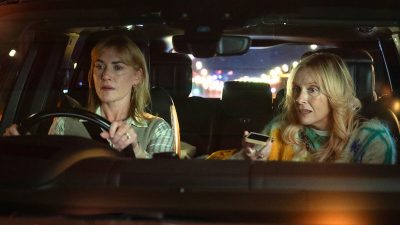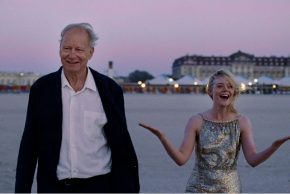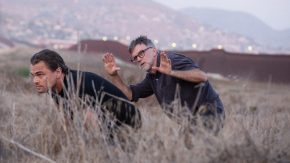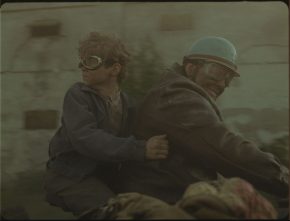It’s not easy to draw a portrait on Welsh bass-baritone Sir Bryn Terfel. This shining star of our times has been been performing on many stages all around the globe, but no matter where he is, a part of his heart is still in Wales. He shows his patriotism not only in his art but also in social engagement. His strong, sonorous voice fits well to classical opera and other musical genres. He even likes experimenting with new genres, and audience loves it just as much as with operas. On the 18th of December 2019, he is going to show his diverse musical approaches in an aria concert in the Müpa.
How it all began
Bryn Terfel was born in 1965 in a village called Pant Glas where his parents worked as farmers. His extraordinary singing talent became obvious at the age of four, so it was never a question whether he should pursue a singing career. A friend of the family taught him to sing for the first time, mostly folk songs. From his original surname Terfel-Jones, he left out Jones as his name was easy to confuse with Welsh baritone Delme Bryn-Jones’ name.
After winning several singing competitions, he moved to London to study in the Guildhall School of Music. His master in the prestigious university was Rudolf Piernay, Berlin-born German vocalist and teacher. By the time he finished his studies, he had already won two prizes, and a year later he was runner-up at the BBC Singer of the World – only Dmitry Hvorostovsky could surpass him.
His career as an opera singer
1990s – his debuts
Terfel’s first opera role was Gugliemo in Cosí fan tutte in the Welsh National Opera. Later, he played in the title role of The Marriage of Figaro, which he brought to the English National Opera. Mozart and especially Figaro are important parts of his career, as it is mostly his debut role at new places, like he was Narrator in The Magic Flute in Brussels, then Figaro again in the Santa Fe Opera. Usually he took a minor role in many operas before getting the main role: he was Masetto and Leporello before Don Giovanni, and Ford before Falstaff.
His first time in the London Covent Garden was in 1992 – he played Masetto while Thomas Allen played Don Giovanni. In the same year, he signed an exclusive contract with the Deutsche Grammophon who publish his albums. His first opera recording was a part of Adriana Lecouvreur, also starring Luciano Pavarotti és Joan Sutherland. Once he recalled how he would never forget the way Pavarotti prepared for singing. During the recording process, Sutherland acclaimed Terfel as a great performer.
He debuted in the Metropolitan in 1994, also as Figaro. Due to health problems, he had to cancel some of his concerts, just like later in 2000. The year 1996 was an important milestone in his career: he started to sing Wagner, his first role being Wolfram in the Tannhäuser. He played in the Scala in Milano, the Carnegie Hall, and the Paris Opera. Once he admitted how extremely nervous he had been before the famously critical Milano audience, and even his previous experiences of singing in front of thousands couldn’t help.
2000s – experimenting
In 2000, Terfel founded the Faenol Festival in Wales. For the following ten years, it run with the cooperation of international opera stars and renowned Welsh artists. In the first year, Terfel and José Carreras and soprano Hayley Westenra in front of ten thousand people. Shortly afterwards, he took a break from opera when singing the main role in the concert version of Sweeney Todd: The Demon Barber of Fleet Street in the Royal Festival Hall London. The idea comes from Terfel himself and his Irish bass-baritone friend Dermot Malone. To prove that he wouldn’t shy away from lighter styles, he recorded a CD with songs by American duo Alan Jay Lerner and Frederick Loewe, as well as by Richard Rodgers and Oscar Hammerstein.
He took a sabbatical year in 2008 to have a break from opera singing, but he interrupted it for the sake of singing in the renovated building of the Wales National Opera in Falstaff. However, we don’t really find Verdi in his repertoire – he told Szilveszter Ókovács at his last time in Budapest that most of the Verdi pieces don’t fit to his voice. For instance, Macbeth is too high for him. This was also the time when he sang Scarpia in Tosca.
2010s – the fulfillment
He has been playing in the BBC Proms (Henry Wood Promenade Concerts), a classical music festival series organised since 1895. He gave concerts in the Royal Albert Hall, one of them in honour of 80-year-old American composer and lyricist Stephen Sondheim. In 2013, he recorded an album called Homeward Bound with the Mormon Church Choir, which he ended up with 58th place on the official British chart. In 2016 in the Royal Opera, he played the main role in Boris Godunov, directed by Antonio Pappano. This was the time of his relevant roles in Wagner operas as well.
From Mozart to Wagner
As opera singer András Molnár once pointed out, if you want to sing Wagner well, you have to sing Tamino from Mozart’s The Magic Flute first. Although Terfel has never sung that particular role, it is still remarkable that in his career, the emphasis gradually went from Mozart to Wagner, the latter ones maybe even more fitting to his voice. He is not only a great singer but can perform the difficult Wagner figures very well. In the beginning of the 2000s, he already sang the Dutchman in The Flying Dutchman. In 2007, many people criticized him for cancelling performances of The Ring of the Nibelung in the Covent Garden due to finger surgeries of one of his children. Then he once again became popular with Figaro in the Metropolitan, but announced he would like to delete this role from his repertoire soon.
In 2010, he sang Hans Sachs in Die Meistersinger von Nürnberg for the first time. Two years later, audience could hear him as Wotan in the Ring-performances in the Covent Garden and the Metropolitan, directed by Robert Lepage. A fan asked Terfel whether he could sing Gurnemanz in the Parsifal, but he said it would be too deep for his voice. Then, in June 2018, he announced he wouldn’t want to add more Wagner operas to his repertoire.
Meetings with the royal family
In 2006, he sang at the concert organised for the Queen’s 80th birthday, and he was the second artist to get the Queen’s Medal for Music, founded by Elizabeth II, as an approval for an extraordinary musical career. He was knighted in 2017 and had to run away in the middle of an opera rehearsal to appear in front of the Queen. After the ceremony he told the BBC he had perceived the experience as pretty surreal, but hoped that his new honour will help him in the promotion of his homeland Wales, and it had been a pretty good feedback on his work and life in general. In 1991, he also got the chance to see ill-fated Princess Diana.
So many colours in one throat
Folk song, mass setting, choral work, musical – these are all parts of Terfel’s repertoire. He likes to try himself out in diverse genres and even looks for such possibilities. In 2010 at the FIFA World Cup in Cardiff, he sang the Welsh anthem before the Wales-Liechtenstein match. He avoids the genres of rock and blues, though, saying they were outside of his boundaries. Otherwise, he likes to listen to Pink Floyd, Dire Straits, Queen and Elvis Presley.
And when Terfel doesn’t sing…
Terfel is proud to represent Welsh language and culture. He is a lead initiator and one of the funders of the Bontnewydd railway station. He approves quality wine and even collects them. He never goes abroad without his Welsh Rugby Union shirt and always has some honey in his bag in case of voice emergencies. He has four children and lives with his second wife who is a musician.
Article: Anna Rácz
Translation: Zsófia Hacsek

























Comments